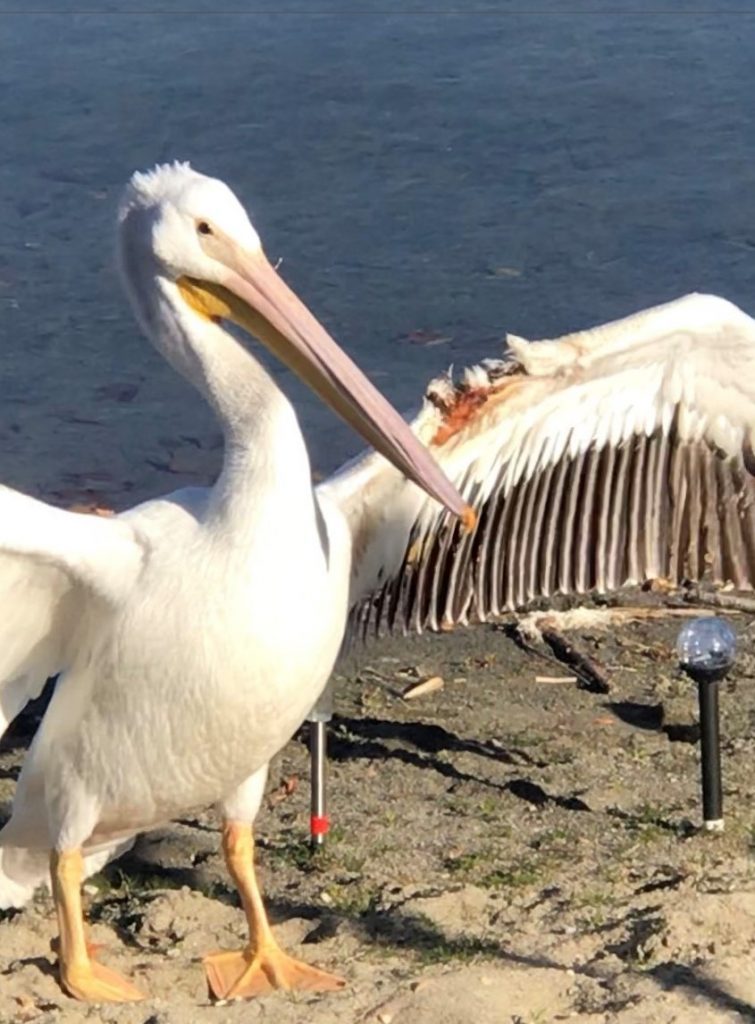Support Us
Since 1979 more than 140,000 animals have been treated by Wildlife Rescue.
Thanks to the support of individuals like you, Wildlife Rescue can provide a lifeline for animals in distress.

American White Pelicans (Pelecanus Erythrohynchos) are a majestic and gregarious bird species that’s a rare encounter for many of us in Canada. During the spring and summer months flocks migrate to the Williams Lake area of BC – the only witnessed breeding ground in Canada. In the fall they head for warmer climates, California and further south.
An endangered species, American White Pelicans are large water birds that make their homes on isolated lakes and shallow wetlands and enjoy private islands for nesting. Their webbed feet are made for excellent water ski landings and strong swimming. White Pelicans hunt for prey by swimming along the surface of the water with their yellowish-orange bill submerged in order to scoop up fish and other aquatic organisms. The pelican will then raise its bill to drain the water and swallow their freshly caught prey. Pelicans travel in large flocks and will often fly for long distances in a distinctive V-formation. If you are lucky enough to spot them in the air, you will notice their graceful soaring displaying their broad and stable black and white wings.
On October 26, 2019, Wildlife Rescue responded to a crisis call when a local observers noticed a pelican grounded on Tucelnuit Lake in Oliver, BC. Based on the severity of its injuries, the lone pelican is suspected to have been stranded for several weeks before the call to Wildlife Rescue was made.

It is assumed that the flock may have stopped to feed and refuel, before continuing on their migratory journey south. Unfortunately, this pelican was left behind after being entangled in fishing line and probably struggled with a hook. This unfortunate encounter with human pollution caused severe wounds and injuries to the bird’s left-wing.
Wildlife Rescue sent out a highly trained rescue ‘team’ on the six-hour drive to Oliver, BC. Capture was successful and the Pelican was taken to the Wildlife Rescue medical staff for examination. At the time of rescue, the Pelican was lethargic and visibly wounded.

There was significant tissue damage to the left-wing including multiple punctures and a large tear in the skin above the elbow (patagium). Examination and assessment with Wildlife Rescues veterinarians determined that this Pelican will likely require 6 – 8 months of longer-term care. Fresh bandages are being applied every 48 hours in conjunction with wound cleaning and debridement. The ligament damage and tissue scarring could potentially put the Pelican at risk of a reduced range of motion.
Ongoing treatment includes daily gentle and diligent physiotherapy, access to a pool for swimming and bathing, fresh air while keeping him warm, AND LOTS OF FISH! His wound is still being treated and the healing is going well.
Rehabilitating aquatic animals is very challenging and Wildlife Rescue is one of the very few facilities with knowledgeable staff to handle this specialized care. Animals that live in water are not able to be on land for long periods of time before additional medical complications set in. Pelicans are large-bodied birds with small legs and feet. They are designed to be floating on water not walking or sitting on hard surfaces. Restricted to land, they will develop serious problems with their feet, legs and possibly the breastbone in the centre of their chest called the “keel”. They also run a higher danger of dehydration as they are not able to drink and absorb the quantities of water they need.
Although Wildlife Rescue has treated hundreds of water birds, we haven’t been in the position of needing to overwinter an American White Pelican. We do have team members that have worked with brown and white Pelicans in California. Medical staff has been in touch with our partners, International Bird Rescue in San Francisco, for support assessing the severity of the injury and evaluating release protentional. Everyone feels that Peli has a chance at returning to his flock in the spring.
As he heals and regains his strength, we will be creating special housing to providePeli with more space to begin to use his wings, a large pool to meet his water needs and at the same time, keeping him warm in the decreasing temperatures of the lower mainland. It’s a big job! We will need to bring in a larger pool and put up a specialized structure inside our largest enclosure (designed for eagles and large hawks), so we can keep him warm, swimming, eating fish and healing all winter long!
He’s not out of the woods yet as we are still treating his wound and doing lab tests to see if he will stabilize. Then we will all work together to make sure he is using that wing!
We will keep you updated on the adventures of Peli as he works his way through an unplanned winter in Burnaby, BC.
Thanks, so much for being a part of this Pelican’s winter of 2019-20 community to see him through until his flock flies back!!
To learn more about the pelican and how you can help please sign up for our newsletter and follow us on social media: Facebook, Twitter, Instagram.